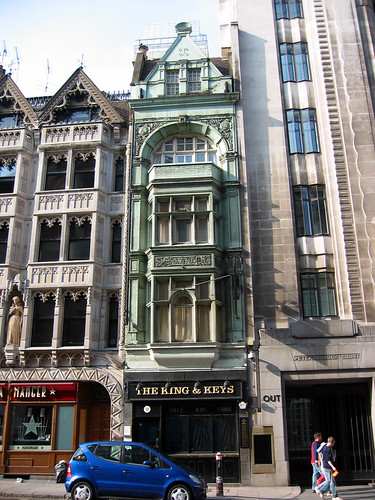Having come to Pickwick backwards, as it were, with almost all the rest of Dickens's novels under my belt, what struck me most was its quality of vibrant, youthful invention. The early numbers betray their origins as sketches commissioned to accompany illustrations: they are little more than fleshed-out versions of the "Sketches by Boz" that Dickens had been turning out for the Morning Chronicle, the loose links between the episodes offering little of the narrative pull that would lead a reader eagerly to seek out the next month's installment. Very quickly, however, it becomes apparent that Dickens has realized that he's stumbled onto something greater than he'd anticipated.
As John Lucas writes in Charles Dickens: The Major Novels (1992), from the satirical opening pages of the book, wherein Pickwick is presented as "a bumptious fool," Dickens quickly
comes to realize that his post of gentlemanly disdain for the Club members simply won't do. They may not be shabby-genteel but a twist of fortune would make them that . . . and anyway, they and their experiences are not to be despised. What this means is that for the first time in English literature a very large section of the population ceases to be invisible except as caricatural material. Just as it had recently won the right to vote, so, some four years later, it finds itself present in the pages of a kind of novel, not treated as a joke or an object of contempt, but with (albeit comic) respect.Dickens is essentially making up the rules of this new type of novel as he goes along, and the rapidity of invention from that point is such that we can almost imagine him, pen in hand, exclaiming with delight as he hits upon new ideas. The character of Sam Weller, who becomes Pickwick's faithful, if irreverent servant, is the first of Dickens's countless unforgettable portraits, and the pleasure he takes in generating Weller's oddities of speech and logic is palpable. Once he begins to string out a rudimentary plot, the basic ground of a Dickens novel--which he would plow with increasing skill, inventiveness, and (sometimes to his detriment) moral seriousness for the next three decades--is apparent.
Oddly, in reading The Pickwick Papers I'm reminded of nothing so much as the early days of the Marvel Universe, when Stan Lee, Jack Kirby, and Steve Ditko, having decided to ignore all the rules of superhero comics, found their unfettered imaginations spiraling out in unexpected--and unexpectedly fruitful--directions. For anyone who grew up reading comic books, to turn back to the early years of The Fantastic Four, The Amazing Spider-Man, The Avengers, or The Incredible Hulk is astonishing: month after month, almost casually, the writers and artists are making stunning creative leaps--all while working on multiple titles and being constantly pressed by deadlines.
Which of course was always the case for Dickens as well, who continued to feel the press of monthly deadlines until near the end of his life. In fact, recently when I was flipping through the very satisfying Oxford Reader's Companion to Dickens (1999), I was reminded of something truly astonishing: Dickens turned out a number of Pickwick every month from March 1836 to November 1837--but November of 1836, Dickens also took on the editorship of Bentley's Miscellany, and in January of 1837 he graced its pages with the first installment of Oliver Twist. From there on, for nearly a full year, Dickens wrote both novels simultaneously, a task which, the Companion rather flatly notes,
he accomplished by devoting the first two weeks of each month to the Miscellany and the latter half of the month to Pickwick.
It does make the whole "holding down a job while blogging" thing seem rather unimpressive, doesn't it?





